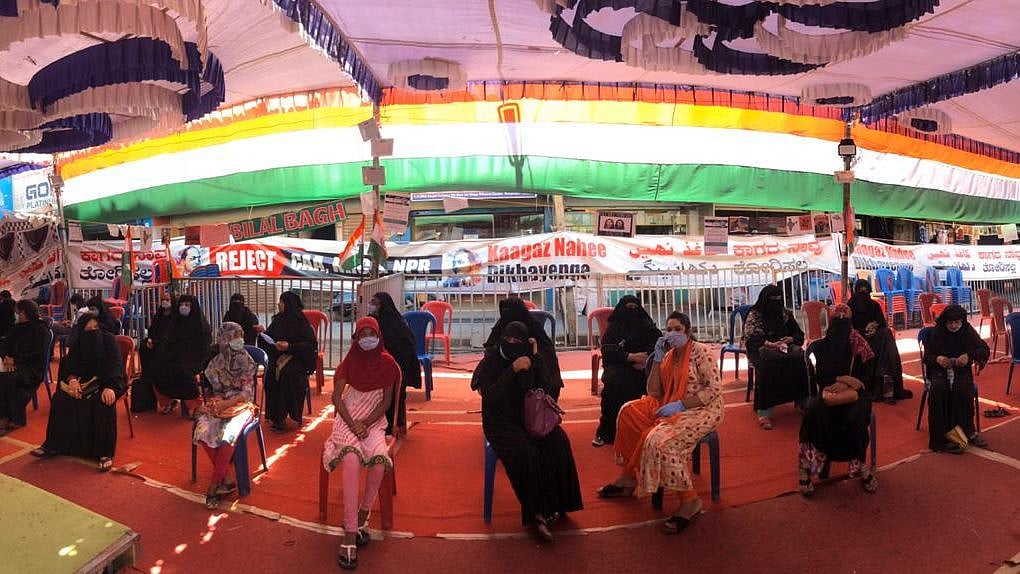After 45 Days, Bilal Bagh Protest Suspended as K’taka Locks Down
Organisers said the protest would be closed to public but will have 5 women, who will stay 24/7 till quarantine ends

advertisement
After 45 days of continuous protest, Bengaluru’s Bilal Bagh, modelled on Shaheen Bagh, suspended the 24x7 sit-in demonstration against CAA over the outbreak of COVID-19 and the state-wide lockdown announced by Chief Minister Yediyurappa on Monday, 24 March.
However, shortly after the protest was suspended for the public and reduced to a symbolic one with 5 participants only, Bengaluru police reportedly came on Tuesday, without masks, pulled down the shamiana, harassing the remaining women.
“Our ladies were practicing quarantine and maintaining distance when suddenly the police came. They had given us permission for 5 women to sit but they took everything down. Now we are sitting in an adjacent shed,” said Saquib, the organiser.
The statement announcing the suspension of protest on Monday night read:
From hundreds of women flocking to Bilal Bagh on Tannery Road 8 February onwards, the number had dwindled to mere tens, sitting resolutely on chairs, one metre away from one another.
The coronavirus outbreak has, thus far, claimed four lives and infected hundreds in India, including 41 in the state as of Wednesday, 25 March.
However, the women of Bilal Bagh in Bengaluru had determined to keep their resistance going, albeit symbolically. The organisers had taken to screening visitors, dispensing sanitizers freely, handing out home-made masks and conducting sessions on the symptoms and spread of the virus.
The Shaheen Bagh area in south Delhi, the epicentre of anti-CAA protests in the country, has been cleared amid the lockdown imposed in Delhi in the wake of the coronavirus outbreak.
In Chennai’s Washermenpet, the protest inspired by Shaheen Bagh was temporarily suspended from Wednesday, 18 March.
Periodic Sanitization & Screening
Prior to the protest being suspended, Saquib, one of the organisers of the Bilal Bagh protest and who heads the team of volunteers, said that the entire area used to be sanitised every day in the morning and at regular intervals.
“Early in the morning, we sanitise the whole place. We make all the visitors wash their hands and seat them at a distance of 1 metre away from each other. We also keep asking them to wash their hands and hand out sanitizer. We have also been making masks of our own and handing them out to everyone who comes and vendors sitting around us,” he said.
In a video shared by the organisers, protesters could be seen cleaning chairs, wiping down surfaces, volunteers helping protesters with masks, and people being sanitised upon entry.
Doctor on Call, Masks Distributed
Saquib explained that while they always had a doctor available for protesters spending long hours at the site, ever since the outbreak, they had had someone sit at the site 24/7 and keep an eye on everyone’s health.
“He keeps checking everyone regularly and keeps an eye on us all. We have asked people not to bring their kids, but if they have to, we make sure they keep washing their hands, and everyone is wearing a mask. We are trying our best to spread awareness about this virus,” he said.
The organisers also said they wanted to take this opportunity to educate locals and the underprivileged about the dangers of coronavirus. They also said they would be conducting free basic health check-ups for those who walked in.
Meanwhile, the protesters had planned to adhere to Prime Minister Modi’s call for a ‘janata curfew’ in a different way.
(At The Quint, we question everything. Play an active role in shaping our journalism by becoming a member today.)